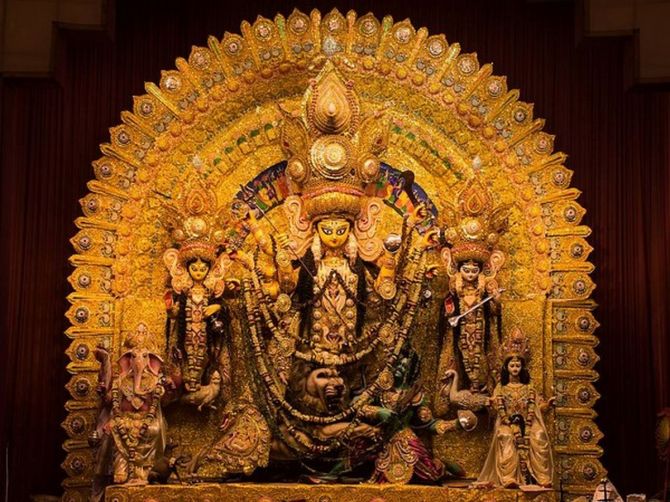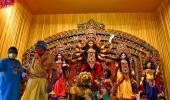Unesco on Wednesday accorded heritage status to Kolkata's Durga puja festival, bringing glory to the country, with Prime Minister Narendra Modi and Chief Minister Mamata Banerjee lauding the move.

"Durga puja in Kolkata has just been inscribed on the intangible heritage list. Congratulations India," the organisation said in a tweet attaching a photo of the goddess with hashtag ’living heritage'.
Modi has hailed Unesco's decision as a "matter of great pride and joy for every Indian".
"Durga Puja highlights the best of our traditions and ethos. And, Kolkata's Durga Puja is an experience everyone must have," he said.
The chief minister underlined that Durga puja was not just a festival, but an emotion.
"Proud moment for Bengal! To every #Bengali across the world, Durga Puja is much more than a festival, it is an emotion that unites everyone. And now, #DurgaPuja has been added to the Representative List of Intangible Cultural Heritage of Humanity. We are all beaming with joy!" she tweeted
The ministry of culture, too, took to the microblogging platform to extend its wishes to the residents of the city on this achievement.
"Overjoyed that 'Durga Puja in Kolkata' joins the @UNESCO Representative List of Intangible Cultural Heritage of Humanity. Many congratulations! It is a confluence of the rich heritage and culture of the county's art, crafts, rituals and practices. Jai Maa Durga!" the ministry wrote.
The department of state information and cultural affairs in Bengal issued a statement to congratulate the people of the state as well as the country.
"The 16th Committee of UNESCO for safeguarding of the Intangible Cultural Heritage (ICH) in its meeting held on 15th December 2021 in Paris has inscribed Durga puja in Kolkata on the representative list of Intangible Cultural Heritage of Humanity," it said.
The department also noted that this was the "first festival in Asia" to get such recognition.
"It is a red letter day for us. In real sense Bengal is now Biswa Bangla. Our congratulations to all the people of Bengal, country and the world. We convey our thanks and gratitude to UNESCO for the recognition bestowed on this great festival as Intangible Cultural Heritage of Humanity," the statement maintained.
Suvaprasanna, the chairman of West Bengal Heritage Commission, said the annual Red Road carnival, which displays the craftsmanship that goes into the making of Durga Puja pandals, have made more people across the world aware of the grandeur that is synonymous with the festival.
"It was Chief Minister Mamata Banerjee who started the Red Road Carnival to showcase the art work, culture and traditions associated with the festival. Durga puja is being celebrated for decades, but the festival got a new dimension with the carnival," he stated.
Welcoming the development, Indologist and academician Nrisingha Prasad Bhaduri said Durga puja is a "universal festival" binding millions of people.
He, however, claimed that the festival should have been accorded the status much earlier.
The annual Red Road carnival, organised ahead of the immersion ceremony, was last held in 2019.
The event was cancelled this year as well as in 2020 owing to the COVID-19 pandemic.
Soumen Dutta, one of the officials of Forum for Durgotsab -- an apex body of community Durga puja committees in the city -- said organisers of the 10-day gala have finally got their due credit.
"Our hard work over the years has yielded desired result. The magnitude of Durga puja celebrations in Bengal has no parallel in the entire world," he underlined.
On its website, Unesco said the "festival has come to signify home-coming or a seasonal return to one's roots”.
"Durga Puja is seen as the best instance of the public performance of religion and art, and as a thriving ground for collaborative artists and designers. The festival is characterised by large-scale installations and pavilions in urban areas, as well as by traditional Bengali drumming and veneration of the goddess," it added.











 © 2025
© 2025